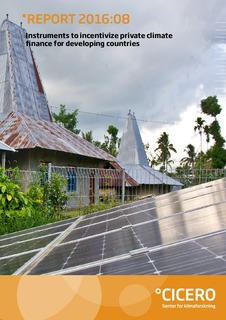| dc.description.abstract | Multiple financial instruments are available to de-risk or reduce costs related to climate mitigation measures and projects in developing countries. The financial instruments can be divided into the categories: revenue support, credit enhancement, direct investments, and insurance. More of these instruments are suited for de-risking than for cost reduction, and especially for reducing market and commercial risks. In terms of cost reduction, the majority of instruments affect transaction costs or the rate of return. Not all financial instruments are suited for all situations. Assessing financial instruments with the help of leverage ratio (amount of private finance raised per unit of public finance spent), scaling-up potential, and reliability, we find that the most suitable or promising instruments are significantly dependent on the context, foremost the ‘climate’ for investments in a country and the sectors invested in. The suitability of financial instruments is guided by the mandate of the agency extending climate finance, the specific goals pursued, and the barriers faced when trying to fulfill these goals. The case studies show that financial instruments often are used in combination to make a transaction possible. We present a procedure for assessing climate finance instruments, consisting of evaluation of barriers that have been observed in specific cases and possible solutions that should be considered, as well as some further checkpoints. This procedure should be helpful for public agencies responsible for designing support, financing schemes and climate-related projects for developing countries. | nb_NO |

